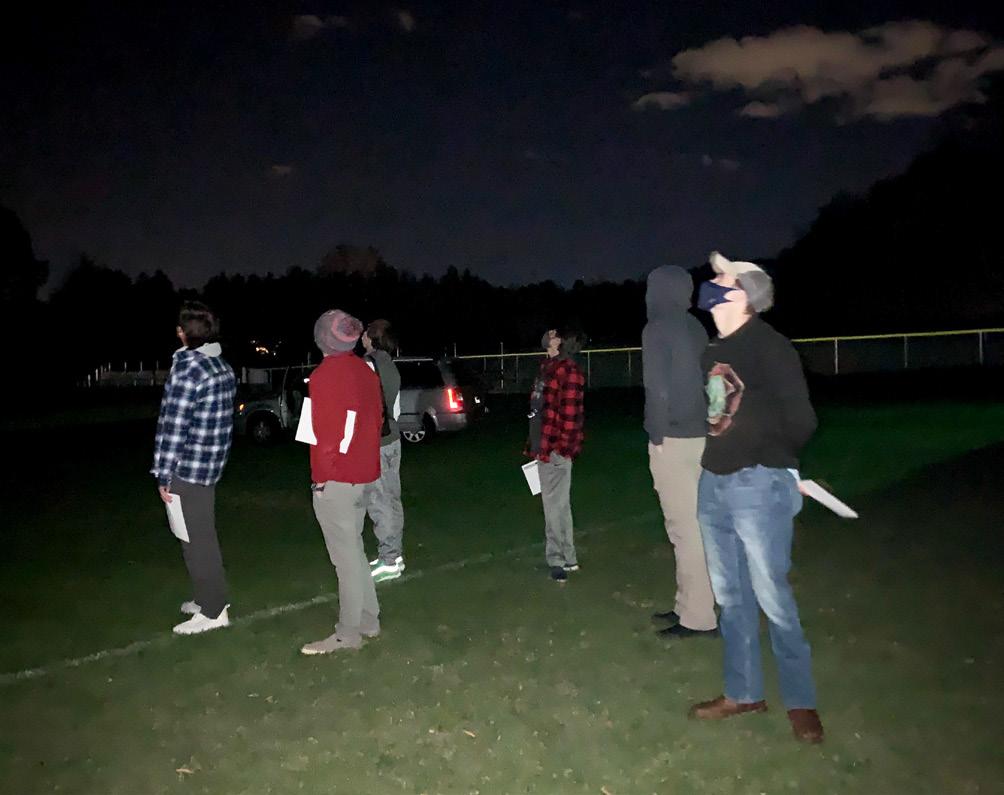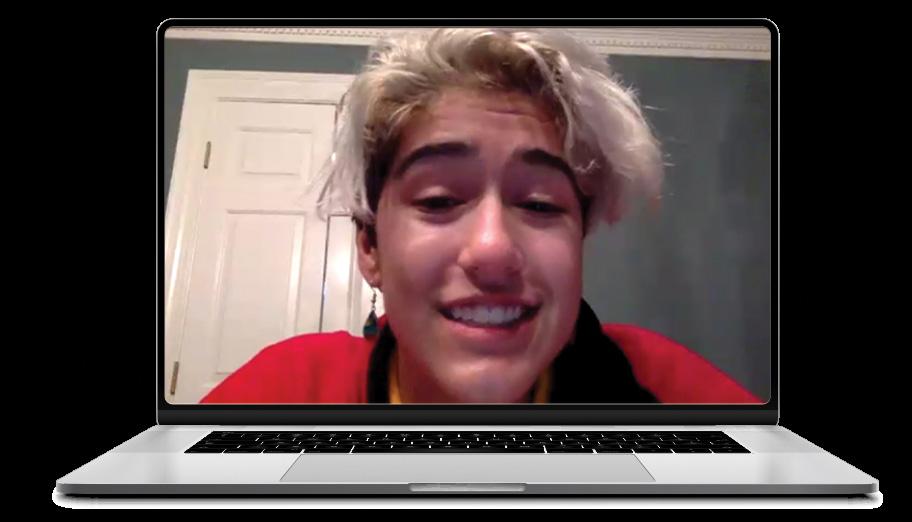
5 minute read
Joining In
Student clubs and organizations survive and thrive through a challenging year
Every year, the International Film Club curates an International Film Festival which highlights art from around the world to give the Trinity community an opportunity to learn more about various cultures and historical events that they may have never learned about. This event usually takes place inside of Trinity’s Academic Building in World Language classrooms. However, adjustments had to be made this time around due to the COVID-19 protocols. “In order to overcome logistical challenges, we had to reformat our original plan for the festival and convert our physical resources to digital ones,” said Rebecca Short ’21, student-leader of the club. “We made a website and a virtual brochure and also decided to host the festival over Netflix Party,” said Short. Other clubs such as the Sci-Fi Club have used the platform too. “We were really excited about having the chat feature, which would allow students to interact during the films, and that students could join the festival from anywhere and still receive the cultural enrichment that is such a key part of the Film Festival,” said Short. The International Film Festival helps bring awareness about the world around us, allowing students to share their thoughts and discuss different topics — something that makes Trinity such an inviting and warm place. The Film Festival is just one of many examples of how Trinity’s student-led clubs have overcome the significant logistical challenges of the pandemic to keep traditions alive while building and maintaining community. Clubs and activities have always been a strong piece of the Trinity community but they have grown to be even stronger during the pandemic. With events and gatherings limited, clubs have become the way to stay in touch and interact with students around campus outside of the classroom. With Trinity’s parallel instruction model, students have been very creative and innovative to keep everyone engaged in person as well as virtually. Many clubs have turned to platforms like Google Classroom, Zoom and Remind to communicate and collaborate. At the beginning of the year, there is usually a huge Club Fair in the Auxiliary Gym, with music, costumes and huge poster boards encouraging students to sign up for as many clubs as possible. This year, students created and shared clever videos, testimonials and Google Classroom codes each morning in virtual Morning Meeting to drum up interest. In some ways, the virtual formats have made club participation more accessible to students. “It has been impressive to see how committed club leaders are to continuing their work even with challenges like shorter meeting times and hybrid meeting formats,” said Laura Hamlin Weiler ’00, head of community engagement. “The students drove these adaptations and were quite innovative”
Advertisement


Clubs are where student interests and passions emerge. “Something we love at Trinity is that our clubs are student-driven,” said Weiler. “If a student or group of students has a passion to share that can benefit the greater community, they have the opportunity to channel that in a club.” Clubs like Theater Club, SciFi Club, Science Society, Culinary Club, and Model UN are providing fun and creative outlets for students to pursue these passions. For example, Model UN held a FUNMUN in January with a mock conference designed to prepare students for interscholastic Model United Nations conferences. In October, the Science Society hosted a socially distanced, outdoor stargazing event in the evening on the baseball field, inviting students to “BYO-Binoculars.” Also, Shields in Service continues to look for ways to boost community spirits with projects like holiday card making, food drives, and delivering goodies for Valentine’s Day.
The fact that all clubs are student driven also allows students to connect with those who have similar experiences as well as creating safe spaces to grow and support others. For the past two years, during the annual GSA chapel, club members have the space to share information with the broader student body and promote acceptance and support of the LGBTQ+ community. “With student-led organizations, members have far greater input because they are so crucial for the continuation of such groups,” said Nicole Dhindsa ’21, student leader for the Gay/Straight Alliance. “Student leadership allows clubs like the GSA to have a greater awareness of the topics that are important to Trinity students.”
Students are also able to share their experiences and ideas with one another and to push themselves to learn more about others and to do more for others through clubs. This happens weekly with clubs like the Black Alliance Initiative, Cultural Awareness Association, the Gay/Straight Alliance, Fellowship of Christian Athletes, Feminist Club, and SEA Club. Over the past year, many difficult social issues have been brought to the forefront, and Trinity students have fully embraced it and understand that change starts within the school community. “Several clubs have tackled very difficult social issues and have found ways to share different perspectives as well as education so that our entire community can be better informed,” said Weiler. “Engaging in this work takes commitment and courage, and we are incredibly grateful to those club leaders for their efforts.” For example, Chandler Grant ’21 and Chaz Sutton ’22 are the pioneers behind the creation of the Black Alliance Initiative, a club that serves as a space for open dialogue on the issues of systemic racism and the historic Black experience in America. “We receive constant support and praise from faculty and students,” said Sutton. “I’ve had so many conversations with different faculty members on the organization, the message behind it, and how grateful they are that this has finally come to Trinity.” The Trinity community benefits from having so many different students from various backgrounds, and bringing them all together through clubs and activities throughout campus is a critical piece of the school’s culture. “Everytime we make an announcement, have a meeting, or give a chapel, I get so many emails and texts from people expressing their support and gratitude,” said Grant. The club is open to any Trinity student to participate and has over 75 active members and continues to see growth and interest in their club.
“Since the pandemic began, clubs have become even more important as we seek ways to safely connect, to engage in dialogue and discussion, to educate one another, to learn, to serve others in the greater Richmond community, and to have fun,” said Weiler. “The power of connection and of understanding has never been more important.”











